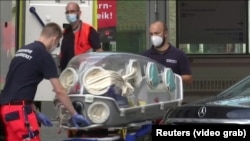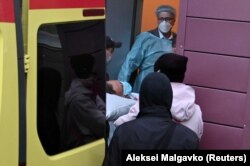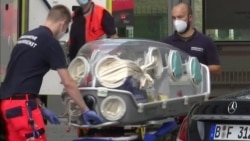For five days now, Russian anti-corruption activist Aleksei Navalny has been comatose, medically induced into unconsciousness in an effort to keep his body from shutting down.
Russian doctors at the Siberian hospital where he was first rushed on August 20 said they didn't know why he fell ill so suddenly. German doctors who treated him after he was airlifted to one of Berlin's best hospitals, however, determined that he suffered poisoning by a toxin in a class of chemicals that includes a deadly Soviet military-grade nerve agent.
The main questions now are what, precisely, the toxic substance is; how it got into Navalny's body; and -- if it was administered deliberately as alleged by the Kremlin critic's colleagues and the German government -- by whom.
On August 24, the Berlin-based Charite hospital where Navalny is receiving treatment confirmed what Navalny’s supporters had been saying for days: that his symptoms, and condition, were consistent with poisoning by an external substance.
"The clinical findings indicate intoxication by a substance from the group of active substances called cholinesterase inhibitors," the hospital said in an August 24 statement.
While the hospital added that "the specific substance involved remains unknown," the finding fueled allegations that Navalny was deliberately poisoned as he traveled to the Russian capital from the Siberian city of Tomsk, where he was investigating corruption.
Accidental Poisoning 'Unlikely'
Asked if it was possible Navalny could have ingested something accidentally, Dan Kaszeta, a veteran chemical and biological weapons expert who now runs a London-based consultancy, said that given the substance identified by the Germans, it was “highly unlikely.”
Accidental poisoning involving this category of chemicals tend to be in agricultural settings, he said, and very infrequent.
Navalny’s case is “just too damn suspicious,” he told RFE/RL.
Colleagues of the 44-year old activist, who led boycotts against Russia's 2018 presidential election after his registration as a candidate was rejected by authorities, have said they suspect tea that he drank at the Tomsk airport was laced with a foreign substance.
After the plane he was traveling in was forced to make an emergency landing in Omsk, Navalny was rushed to a hospital for treatment and placed into an induced coma.
Doctors for two days refused pleas by his relatives and his wife to release Navalny for treatment elsewhere, calling it "an attempt on his life" and a ploy intended to stall until traces of poison could no longer be found in his body.
It was only after Navalny's wife, Yulia Navalnaya, demanded that President Vladimir Putin allow her husband and staunch Kremlin critic be allowed treatment in Germany that he was rushed by air ambulance to Berlin on August 22. For its part, the Kremlin denied that Putin had gotten involved at all.
The Charite hospital's discovery of cholinesterase inhibitors -- toxins that can be used as chemical weapons and have been known to be used in assassinations -- led to increased calls for an investigation into Navalny's suspected poisoning.
Russian Skepticism
Russian health officials were quick to challenge the idea that the substance -- part of a broad range of chemicals that are also found in several drugs and in some pesticides -- was responsible.
Aleksandr Sabayev, the chief toxicologist of the Omsk region and the Siberian Federal District, said on August 24 that Navalny's symptoms were not consistent with those caused by cholinesterase inhibitors.
"Upon admission to the hospital, Aleksei Navalny underwent testing for a wide range of narcotic, synthetic substances, psychedelics, and medicinal substances, including cholinesterase inhibitors," Sabayev was quoted as saying by the Russian state news agency RIA Novosti. "The result was negative."
But Vil Mirzayanov, a scientist involved in developing the Soviet-era nerve agent Novichok, told Current Time on August 24 that cholinesterase inhibitors are "organophosphate toxic substances" that can include nerve agents such as Novichok as well as sarin and soman.
Novichok came to wide public awareness after it was used in the 2018 poisoning of former Russian spy Sergei Skripal and his daughter in England. British prosecutors have charged that two men believed to be Russian military intelligence agents were behind the attack, which ended up killing a British woman, apparently by accident.
The attack prompted an outraged response that included Britain and other Western allies expelling dozens of Russian diplomats.
Cholinesterase inhibitors can "suppress receptors, and in the event of poisoning muscle control is lost,” Mirzayanov explained to Current Time, the Russian-language network led by RFE/RL in cooperation with VOA.
German Chancellor Angela Merkel called for Russia to investigate the apparent attack on Navalny.
“In light of the prominent role played by Mr. Navalny in the political opposition in Russia, the authorities there are now urgently called upon to investigate this crime to the last detail -- and do so in full transparency,” she said in a joint statement with Foreign Minister Heiko Maas on August 24. "Those responsible must be identified and held accountable.”
In an indication of how serious Germany considered the threat against Navalny, guards were assigned to protect the hospital unit and room where he was, because "one can say with near certainty that it was a poisoning attack,” a Merkel spokesman announced.
The Kremlin responded on August 25 by saying there was no immediate need to open an investigation, and suggested that the German doctors treating the Russian opposition leader were "rushing" to use the word poisoning.
"If the substance is identified and if it is determined that it is poisoning, then, of course, this will be a reason for investigation," spokesman Dmitry Peskov told reporters.
Kaszeta, the chemical weapons expert, said, that if the Germans were rushing, it was because they needed to identify the foreign substance and treat it immediately: both to ensure that Navalny lived, but also to identify the substance before his body metabolizes it and it becomes impossible to detect.
Mirzayanov said it was difficult for him to say what Navalny's poisoning was caused by until there was testing using something called a gas chromatography-mass spectrometric analysis, which could then be compared to a database of all known toxic substances.
In its August 24 statement, the Charite hospital did not specify how it had determined that cholinesterase inhibitors were present in Navalny's body. The hospital said only that "multiple tests" in independent laboratories had been used, and that a "further series of comprehensive testing has been initiated."
The hospital also said Navalny could face long-term consequences.
"As a result of this diagnosis, the patient is now being treated with the antidote atropine," the statement said. "Navalny's prognosis remains unclear; the possibility of long-term effects, particularly those affecting the nervous system, cannot be excluded."
The hospital did not immediately respond to further questions from RFE/RL.
Mirzayanov painted a similarly dire picture, saying it was a "very long, painful process to remove these substances from the body."
"The consequences are very bad. Poisoning is almost irrevocable, unfortunately," he said. "Years of rehabilitation are needed."







